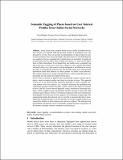| dc.contributor.author | Hegde, V | |
| dc.contributor.author | Parreira, J.X | |
| dc.contributor.author | Hauswirth, M | |
| dc.date.accessioned | 2014-02-05T16:36:07Z | |
| dc.date.available | 2014-02-05T16:36:07Z | |
| dc.date.issued | 2013 | |
| dc.identifier.citation | Hegde, V; Parreira, J.X; Hauswirth, M (2013) Semantic Tagging of Places Based on User Interest Profiles from Online Social Networks 35th European Conference on Information Retrieval | en_US |
| dc.identifier.uri | http://hdl.handle.net/10379/4155 | |
| dc.description.abstract | In the recent years, location based services (LBS) on mobile devices
have become very popular. With the growing number of smartphone users, the
demand for services that can provide recommendation of places based on user
location and interest has increased rapidly. The performance of such LBS depends
on a number of factors, including how well the places are described. A number of
location based services allow users to check-in at places, i.e. users can let others
know of their whereabouts. Even though they also enable users to manually tag
places they have visited, users rarely do so. Moreover, the available information
attached to places (e.g. their names) is often ambiguous or insufficient for service
providers to automatically generate tags. On the other hand, users often provide
information about their interests in online profiles via online social networks.
The common interests of a group of people that has visited a particular place can
potentially provide further description for the place.
In this work we present an approach that automatically assigns semantic tags to
places, based on interest profiles and check-in activities of users. The approach
consists of: (i) an interest profile expansion algorithm to derive semantic concepts
related to the user interests; (ii) a model to determine the probability that
a particular semantic concept describes a place, based on the check-in activities
of users; and (iii) a noise removal approach, using a hierarchical clustering technique,
which is applied on the top probable semantic concepts to derive the final
semantic tags for places.We have evaluated our approach with real world datasets
from popular social network services, against a set of manually assigned tags. The
experimental results show that not only we are able to automatically derive meaningful
tags for different places, but also that the sets of tags assigned to places are
expected to stabilise as more unique users check-in at places. This indicates that
top probable tags derived can be consistently assigned to places irrespective of
the number of people who have checked-in at those places. | en_US |
| dc.format | application/pdf | en_US |
| dc.language.iso | en | en_US |
| dc.relation.ispartof | 35th European Conference on Information Retrieval | en |
| dc.rights | Attribution-NonCommercial-NoDerivs 3.0 Ireland | |
| dc.rights.uri | https://creativecommons.org/licenses/by-nc-nd/3.0/ie/ | |
| dc.subject | Place tagging | en_US |
| dc.subject | Recommendation systems | en_US |
| dc.subject | Data mining | en_US |
| dc.subject | Online social networks | en_US |
| dc.subject | Location based services | en_US |
| dc.title | Semantic Tagging of Places Based on User Interest Profiles from Online Social Networks | en_US |
| dc.type | Conference Paper | en_US |
| dc.date.updated | 2014-01-24T17:28:38Z | |
| dc.description.peer-reviewed | peer-reviewed | |
| dc.contributor.funder | |~| | |
| dc.internal.rssid | 5757934 | |
| dc.local.contact | Vinod Kumar Hedge, Deri, Nui Galway. Email: vinodkumar.hedge@nuigalway.ie | |
| dc.local.copyrightchecked | No | |
| dc.local.version | ACCEPTED | |
| nui.item.downloads | 740 | |


